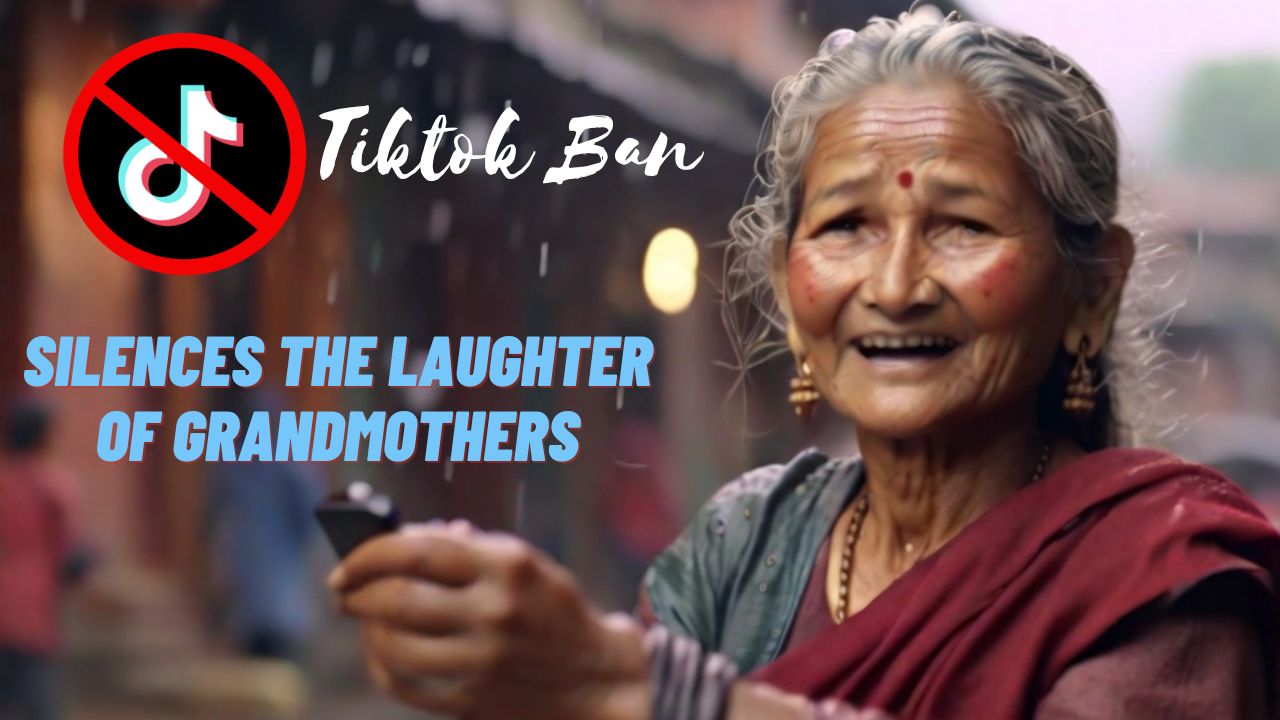
- Swechhya Raut –
In the vast realm of social media, where trends come and go, there exists a tale of unexpected sorrow – a story of grandmothers who found joy in the most unexpected place: TikTok. It’s a narrative that transcends the digital divide, delving into the lives of those who, despite having weathered countless storms, found a glimmer of happiness in the world of short videos and dance challenges.
I noticed that my grandmothers were at their happiest when they were singing or dancing.
The matriarch of our home used to lose herself in the rhythm of Asare or Kathe Bhaka (folk songs), and we, in turn, captured those moments of unbridled joy on video. She would playfully scold us, pushing away the camera saying, “Don’t recordl! It is a matter of shame.” Yet, a twinkle of embarrassment and overwhelming happiness would dance in her eyes as she watched herself on the screen.
About two years ago, at the ripe age of 84, she expressed a desire for a mobile phone for the first time. She knew it could play songs and showcase videos. Unfortunately, fate took a bitter turn, and my grandmother passed away before she could fully explore the world of mobile devices.
It was then that Mamaghar’s (maternal) grandmother, proficient in both dancing and singing, took center stage.
Initially hesitant to dive into the world of video-making, she would often inquire, “What will others say when they see it?” The advent of TikTok during the Covid pandemic provided the answer she needed. As she browsed through the platform, she discovered individuals older than her dancing and singing, giving her the confidence to share her own talents.
With newfound enthusiasm, she requested us to film her dancing and post it on TikTok. The response was heartening – praise for her infectious enthusiasm and commendation for her dancing skills. Soon, at every family gathering, she’d inquire, “Won’t you make a video for your grandmother?”
Yet, time was a luxury my maternal grandmother barely had, juggling responsibilities on the farm. The same person who once dismissed the importance of a phone found solace in choosing songs that resonated with her heart, expressing herself through dance and song.
This is, to me, the most literate and independent form of her that I have witnessed. Before this, she had hidden her desire for responsibility under the responsibility of household chores for decades.
Widowed almost three decades ago, she had seemingly abandoned the notion of putting on makeup. Recently, before making a video, she has also started to doll-up herself.
Living in a village near by Nagadhunga, her experiences seemed confined. TikTok introduced her to a different world, erasing the veil of loneliness that had shrouded her.
Then came the sudden blow of the government ban on TikTok. It was a moment that made me reflect on my grandmother and others of her generation who had finally found a medium to release their repressed dreams and latent desires. Those grandmothers, who had always played supportive roles in the background, had learned to make themselves the central characters in the latter part of their lives.
As they endeavored to adapt, accusations of “spoiling social harmony” suddenly befell them. Unlike us, they couldn’t grasp the intricacies of VPNs or form strong opinions on government decisions through Facebook or Twitter. Overnight, the vibrant grandmothers who once graced TikTok found themselves quietly making video calls, seeking solace in the comforting green light of their granddaughters’ messenger apps.
In a world where we used TikTok according to our convenience, presenting ourselves as we wished, the abrupt ban left a void. Listening to my grandmother’s voice now brings a poignant realization – our grandmothers, who had given their entire lives, have been treated unfairly.
Writing this in the dead of night, my heart is heavy with sorrow. Tomorrow, this post may disappear into the vast sea of social media, but the question lingers – did our grandmother generation not learn to resist, or did they simply choose not to? It’s a question that echoes the silent, unseen heartbreak of a generation that found joy in the most unexpected corners of the digital world.